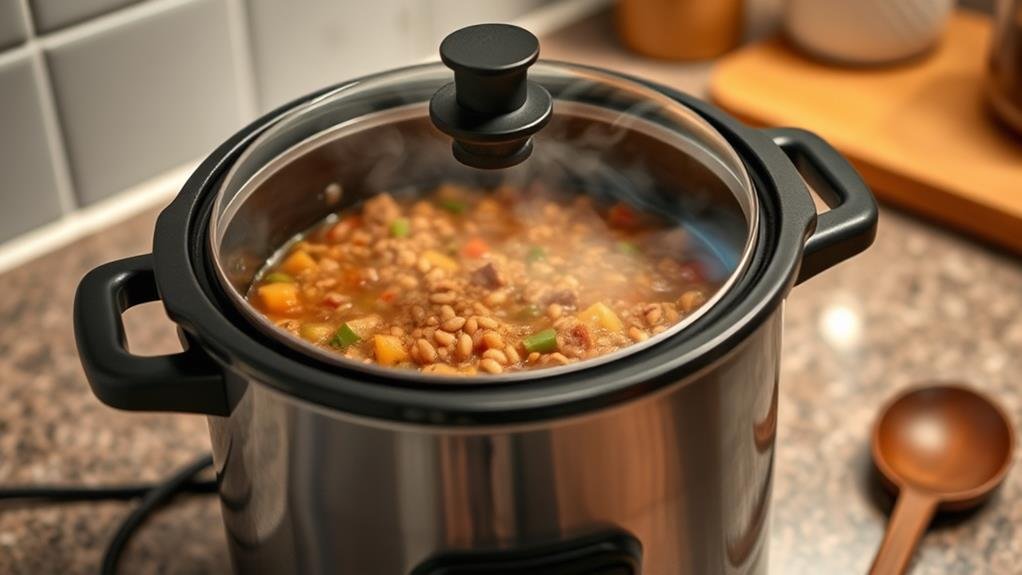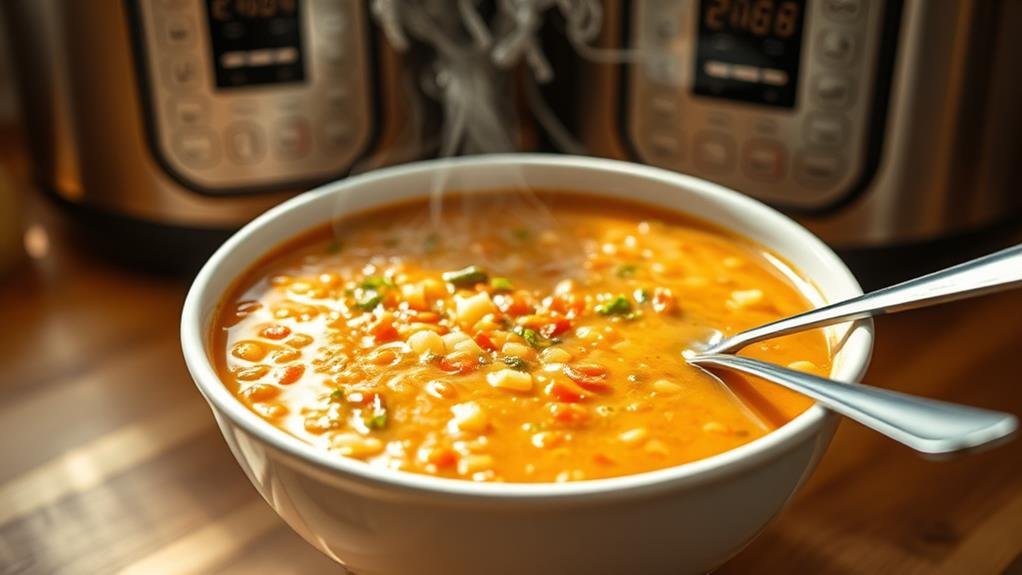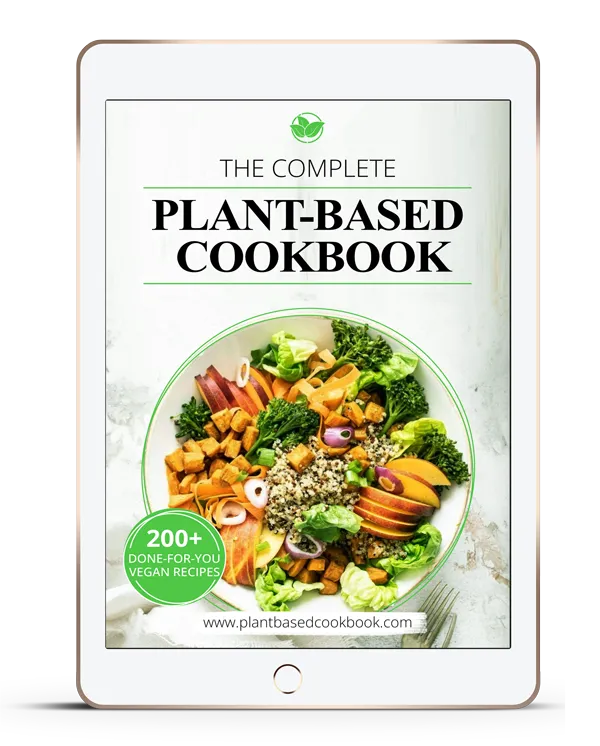Like a warm hug on a chilly day, my lentil soup recipe offers comfort in a bowl, all made effortlessly in a rice cooker. I’ve perfected this method over years of experimentation, streamlining the process for maximum flavor and convenience. In this guide, I’ll walk you through each step, from selecting the ideal ingredients to achieving the perfect consistency.
You’ll discover how to harness your rice cooker’s capabilities to create a nourishing, protein-packed meal with minimal effort. Whether you’re a busy professional or a kitchen novice, this technique will transform your approach to wholesome cooking.
Let’s explore how to raie up a simple lentil soup into a culinary masterpiece.
Table of Contents
ToggleIngredients You’ll Need
For this lentil soup recipe, you’ll need a specific set of ingredients to create a hearty and nutritious meal in your rice cooker. I’ve carefully selected each component to ensure a balanced and flavorful dish that’s easy to prepare.
The foundation of the soup consists of lentils, which provide a rich source of protein and fiber. I’ve also included rice and barley to add texture and substance to the dish. These grains complement the lentils perfectly and help create a satisfying meal.
To enhance the flavor profile, I use olive oil and garlic. The olive oil adds a subtle richness, while the garlic infuses the soup with a savory depth. For the liquid base, I recommend using a stock concentrate. This concentrated form of broth intensifies the overall taste and reduces the need for additional seasonings.
All these ingredients are designed to work seamlessly in your rice cooker, allowing for a convenient one-pot meal. If you’re looking to boost the protein content, I suggest adding cooked chicken as a topping. This addition transforms the soup into an even more substantial dish, perfect for a fulfilling dinner or lunch option.
Preparing Your Rice Cooker
Now that we’ve gathered our ingredients, it’s time to prepare the rice cooker for our lentil soup. I’ll guide you through the process step-by-step to make sure we create a delicious and nutritious meal.
First, I thoroughly rinse the rice, lentils, and barley. This step is important to remove any debris or excess starch. Once cleaned, I place them in the rice cooker pot. Next, I add olive oil, minced garlic, and stock concentrate, stirring well to distribute the flavors evenly throughout the mixture.
To make sure proper cooking, I pour water into the rice cooker until it reaches the 4 1/2-cup mark. This precise measurement is vital for achieving the perfect consistency.
Here’s a quick reference table for the rice cooker preparation process:
| Step | Action | Duration |
|---|---|---|
| 1 | Rinse ingredients | 2-3 minutes |
| 2 | Add to rice cooker | 1 minute |
| 3 | Add flavorings | 1 minute |
| 4 | Add water | 30 seconds |
Once everything is in the rice cooker, I set it to cook for approximately 30 minutes or until the rice and lentils are tender. For added protein, I sometimes top the soup with cooked chicken before serving.
Cooking the Lentil Soup

With all ingredients and flavorings in place, it’s time to kick off the cooking process. I confirm the rice cooker pot contains the thoroughly rinsed lentils, rice, and barley, along with the olive oil, garlic, and stock concentrate I’ve added for flavor.
After stirring the mixture well to distribute these flavors evenly, I carefully pour water into the rice cooker. I stop when the liquid reaches the 4 1/2-cup mark, which provides the proper cooking liquid ratio for this recipe.
Now, I close the rice cooker lid and start the cooking cycle. The lentil soup typically takes around 30 minutes to cook, during which time the rice cooker works its magic, transforming the raw ingredients into a tender, flavorful mixture.
I refrain from lifting the lid during cooking, as this can affect the cooking time and result.
Once the rice cooker signals that it’s finished, I open the lid and check that the rice and lentils are tender. If I’m looking to enhance the protein content of my meal, I’ll consider topping the lentil soup with some pre-cooked chicken before serving.
Enhancing Flavors and Textures
After the rice cooker has completed its cycle, I focus on enhancing the flavors and textures of the lentil soup.
First, I add aromatic spices like cumin, coriander, and smoked paprika to deepen the flavor profile. These spices work well in slow cooker recipes, complementing the lentils’ earthy taste.
To introduce freshness, I stir in chopped parsley, cilantro, or thyme. These herbs brighten the soup and provide a pleasant contrast to the rich lentils.
Next, I improve the texture by incorporating diced vegetables such as bell peppers, zucchini, or tomatoes. This step adds variety to each spoonful and creates a more satisfying mouthfeel.
For a creamier consistency, I blend a portion of the soup and mix it back in. This technique thickens the soup without adding extra ingredients.
Serving Suggestions

The versatility of this lentil soup makes it an ideal canvas for various serving suggestions. I often enjoy it as a standalone meal, but pairing it with a side salad or crusty bread can create a more substantial option. To enhance the soup’s flavor profile, I recommend experimenting with different toppings and garnishes.
Here’s a table outlining some of my favorite serving suggestions:
| Main Dish | Side Options | Garnishes |
|---|---|---|
| Lentil Soup | Crusty Bread | Fresh Herbs |
| Lentil Soup | Side Salad | Yogurt Dollop |
| Lentil Soup | Grilled Vegetables | Grated Cheese |
For a heartier meal, I sometimes add cooked proteins like shredded chicken, diced ham, or crumbled sausage to the soup before serving. To elevate the texture and visual appeal, I drizzle each bowl with high-quality olive oil, squeeze fresh lemon juice over the top, or sprinkle red pepper flakes for a hint of heat. These simple additions can transform this nutritious and satisfying lentil soup into a memorable dining experience, suitable for both lunch and dinner.
Storing and Reheating Tips
Proper storage and reheating techniques are crucial for maintaining the quality and safety of your lentil soup. After enjoying your meal, I recommend storing any leftovers in an airtight container. Place this container in your refrigerator, where it will stay fresh for 4-5 days.
When you’re ready to enjoy your soup again, you have two reheating options.
My preferred method is using the stove top. Simply pour the desired amount into a pot and heat it over low flame. Stir occasionally to guarantee even warming and prevent sticking.
If you’re short on time, the microwave is a viable alternative. Heat the soup in short bursts, stirring between intervals for uniform temperature distribution.
Regardless of your chosen method, I suggest adding a splash of water or broth during reheating. This prevents the soup from becoming too thick and helps restore its original consistency.
For longer-term storage, consider freezing individual portions. When you’re ready to eat, thaw a portion overnight in the refrigerator before reheating. These techniques will secure your lentil soup remains delicious and safe to consume.
Health Benefits of Lentils

Beyond preserving your lentil soup, let’s examine why lentils are a smart choice for your health. I’ve found that incorporating lentils into my diet has been a game-changer for my overall wellness. These tiny legumes are nutritional powerhouses, packed with fiber, protein, vitamins, and essential minerals like folate, iron, and potassium. What’s more, they’re low in calories and fat, making them an excellent option for weight management and heart health.
As a plant-based protein source, lentils are particularly beneficial for vegetarians and vegans. I’ve noticed that including lentils in my meals has helped me maintain stable blood sugar levels and improve my digestive health. Research suggests that regular consumption of lentils may also contribute to lower cholesterol levels.
One of the best aspects of lentils is their versatility and quick cook time. In just 20-30 minutes, you can prepare a nutritious and satisfying meal. Whether you’re making soup in a rice cooker or incorporating lentils into other dishes, you’re providing your body with a wealth of health benefits. By choosing lentils, you’re making a smart investment in your long-term health and well-being.
Customizing Your Lentil Soup
Countless options exist for customizing your lentil soup in a rice cooker. I’ve found that adding extra vegetables like spinach, kale, or bell peppers not only enhances the nutritional value but also introduces new flavors and textures. To create a unique taste profile, I experiment with different seasonings such as cumin, smoked paprika, or curry powder.
For a heartier meal, I often incorporate cooked chicken, sausage, or bacon, which adds protein and depth to the soup. If you’re looking for a creamier consistency, I recommend blending a portion of the cooked soup using an immersion blender or food processor before serving.
To elevate the taste further, I sometimes add a splash of hot sauce, a squeeze of lemon juice, or a dollop of Greek yogurt, which provides a burst of brightness and tanginess.
For those who enjoy a more substantial soup, consider adding brown rice to increase the dish’s fiber content and create a more filling meal. By customizing your lentil soup, you can transform a simple recipe into a personalized culinary experience that caters to your specific tastes and nutritional needs.
Conclusion
I’ve shared my simple recipe for a comforting lentil soup made effortlessly in a rice cooker. This versatile dish offers both convenience and nutrition. Did you know that lentils contain up to 18 grams of protein per cup? That’s equivalent to the protein in a 3-ounce serving of salmon. By incorporating this nutrient-dense legume into your diet, you’re not only enjoying a delicious meal but also fueling your body with essential nutrients for peak health.





